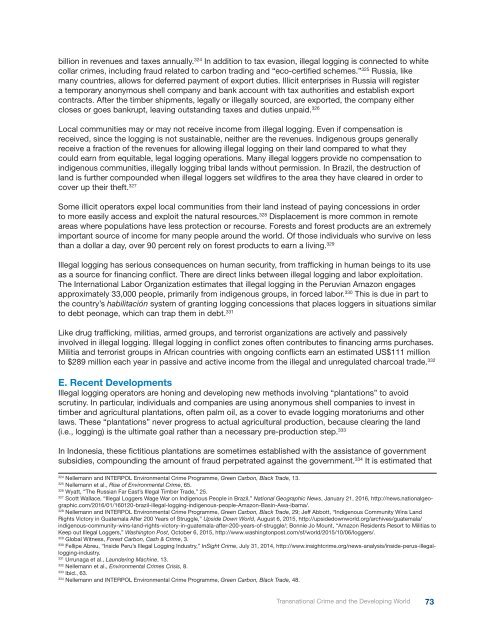Transnational Crime and the Developing World
Transnational_Crime-final
Transnational_Crime-final
You also want an ePaper? Increase the reach of your titles
YUMPU automatically turns print PDFs into web optimized ePapers that Google loves.
illion in revenues <strong>and</strong> taxes annually. 324 In addition to tax evasion, illegal logging is connected to white<br />
collar crimes, including fraud related to carbon trading <strong>and</strong> “eco-certified schemes.” 325 Russia, like<br />
many countries, allows for deferred payment of export duties. Illicit enterprises in Russia will register<br />
a temporary anonymous shell company <strong>and</strong> bank account with tax authorities <strong>and</strong> establish export<br />
contracts. After <strong>the</strong> timber shipments, legally or illegally sourced, are exported, <strong>the</strong> company ei<strong>the</strong>r<br />
closes or goes bankrupt, leaving outst<strong>and</strong>ing taxes <strong>and</strong> duties unpaid. 326<br />
Local communities may or may not receive income from illegal logging. Even if compensation is<br />
received, since <strong>the</strong> logging is not sustainable, nei<strong>the</strong>r are <strong>the</strong> revenues. Indigenous groups generally<br />
receive a fraction of <strong>the</strong> revenues for allowing illegal logging on <strong>the</strong>ir l<strong>and</strong> compared to what <strong>the</strong>y<br />
could earn from equitable, legal logging operations. Many illegal loggers provide no compensation to<br />
indigenous communities, illegally logging tribal l<strong>and</strong>s without permission. In Brazil, <strong>the</strong> destruction of<br />
l<strong>and</strong> is fur<strong>the</strong>r compounded when illegal loggers set wildfires to <strong>the</strong> area <strong>the</strong>y have cleared in order to<br />
cover up <strong>the</strong>ir <strong>the</strong>ft. 327<br />
Some illicit operators expel local communities from <strong>the</strong>ir l<strong>and</strong> instead of paying concessions in order<br />
to more easily access <strong>and</strong> exploit <strong>the</strong> natural resources. 328 Displacement is more common in remote<br />
areas where populations have less protection or recourse. Forests <strong>and</strong> forest products are an extremely<br />
important source of income for many people around <strong>the</strong> world. Of those individuals who survive on less<br />
than a dollar a day, over 90 percent rely on forest products to earn a living. 329<br />
Illegal logging has serious consequences on human security, from trafficking in human beings to its use<br />
as a source for financing conflict. There are direct links between illegal logging <strong>and</strong> labor exploitation.<br />
The International Labor Organization estimates that illegal logging in <strong>the</strong> Peruvian Amazon engages<br />
approximately 33,000 people, primarily from indigenous groups, in forced labor. 330 This is due in part to<br />
<strong>the</strong> country’s habilitación system of granting logging concessions that places loggers in situations similar<br />
to debt peonage, which can trap <strong>the</strong>m in debt. 331<br />
Like drug trafficking, militias, armed groups, <strong>and</strong> terrorist organizations are actively <strong>and</strong> passively<br />
involved in illegal logging. Illegal logging in conflict zones often contributes to financing arms purchases.<br />
Militia <strong>and</strong> terrorist groups in African countries with ongoing conflicts earn an estimated US$111 million<br />
to $289 million each year in passive <strong>and</strong> active income from <strong>the</strong> illegal <strong>and</strong> unregulated charcoal trade. 332<br />
E. Recent Developments<br />
Illegal logging operators are honing <strong>and</strong> developing new methods involving “plantations” to avoid<br />
scrutiny. In particular, individuals <strong>and</strong> companies are using anonymous shell companies to invest in<br />
timber <strong>and</strong> agricultural plantations, often palm oil, as a cover to evade logging moratoriums <strong>and</strong> o<strong>the</strong>r<br />
laws. These “plantations” never progress to actual agricultural production, because clearing <strong>the</strong> l<strong>and</strong><br />
(i.e., logging) is <strong>the</strong> ultimate goal ra<strong>the</strong>r than a necessary pre-production step. 333<br />
In Indonesia, <strong>the</strong>se fictitious plantations are sometimes established with <strong>the</strong> assistance of government<br />
subsidies, compounding <strong>the</strong> amount of fraud perpetrated against <strong>the</strong> government. 334 It is estimated that<br />
324<br />
Nellemann <strong>and</strong> INTERPOL Environmental <strong>Crime</strong> Programme, Green Carbon, Black Trade, 13.<br />
325<br />
Nellemann et al., Rise of Environmental <strong>Crime</strong>, 65.<br />
326<br />
Wyatt, “The Russian Far East’s Illegal Timber Trade,” 25.<br />
327<br />
Scott Wallace, “Illegal Loggers Wage War on Indigenous People in Brazil,” National Geographic News, January 21, 2016, http://news.nationalgeographic.com/2016/01/160120-brazil-illegal-logging-indigenous-people-Amazon-Basin-Awa-ibama/.<br />
328<br />
Nellemann <strong>and</strong> INTERPOL Environmental <strong>Crime</strong> Programme, Green Carbon, Black Trade, 29; Jeff Abbott, “Indigenous Community Wins L<strong>and</strong><br />
Rights Victory in Guatemala After 200 Years of Struggle,” Upside Down <strong>World</strong>, August 6, 2015, http://upsidedownworld.org/archives/guatemala/<br />
indigenous-community-wins-l<strong>and</strong>-rights-victory-in-guatemala-after-200-years-of-struggle/; Bonnie Jo Mount, “Amazon Residents Resort to Militias to<br />
Keep out Illegal Loggers,” Washington Post, October 6, 2015, http://www.washingtonpost.com/sf/world/2015/10/06/loggers/.<br />
329<br />
Global Witness, Forest Carbon, Cash & <strong>Crime</strong>, 3.<br />
330<br />
Fellipe Abreu, “Inside Peru’s Illegal Logging Industry,” InSight <strong>Crime</strong>, July 31, 2014, http://www.insightcrime.org/news-analysis/inside-perus-illegallogging-industry.<br />
331<br />
Urrunaga et al., Laundering Machine, 13.<br />
332<br />
Nellemann et al., Environmental <strong>Crime</strong>s Crisis, 8.<br />
333<br />
Ibid., 63.<br />
334<br />
Nellemann <strong>and</strong> INTERPOL Environmental <strong>Crime</strong> Programme, Green Carbon, Black Trade, 48.<br />
<strong>Transnational</strong> <strong>Crime</strong> <strong>and</strong> <strong>the</strong> <strong>Developing</strong> <strong>World</strong> 73


